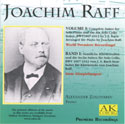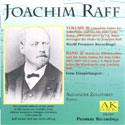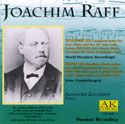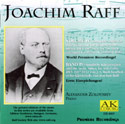AK/Coburg Recordings |
RECORDINGS OF EXCEPTIONAL INTEREST This is really quite an arresting collection found on these four CDs: all seven of the suites for solo piano and the arrangements for piano of the six suites for solo cello by Johann Sebastian Bach from the pen of the pianist and composer Joachim Raff (1822-82) and it amazes that it has taken so long until the Raff piano suites have finally been recorded for the first time. Especially since almost half of his voluminous output was written for solo piano. Born the son of a German father in Switzerland, he was educated in a monastery school and learned to pay violin and piano. It wasn't long before he had finished his first compositions. However it was only after a friend had encouraged him to send his works to Mendelssohn, that the career of the young musician took off. Mendelssohn recommended Raff to his publisher Breitkopf and Härtel and thereafter followed the first euphoric reviews in Robert Schumann's Neue Zeitschrift für Musik, which only additionally encouraged him to devote himself to composition. When he came in contact with Liszt, who promoted his young colleague and his works and his name soon became well known. He lived and worked a long time in Wiesbaden and it was there that the suites came into being. Now the small American label AK/Coburg, which has already issued a series of CDs featuring works of Felix Draeseke, has taken on these suites for piano and entrusted the interpretation of them to the young Russian pianist Alexander Zolotarev on these four CDs. Born 1968 in St. Petersburg this pianist, who studied with Pavel Gililov in Russia and also at the Institute for Music in Cologne, understands how to illuminate the profound world of ideas implicit in the apparent simplicity of Raff's manner of writing. Yes, there is dance everywhere, even if polyphony seems to stand out most prominently among Raff's considerations, as if he wanted to express a series of stylized dances in characterization of movements with titles like “Toccatina”, “Romanza” or, as in the 5th Suite “Elegy in Sonata Form”. That he progressed throughout these suites is not difficult to hear. Aside from the fact that Raff deals more and more freely with the notion of what a suite is, pianistic requirements are also staggered. Zolotarev certainly understands to bring the melodic in what is written to the foreground even in the ever prevalent virtuosity and volatility. Not all of these suites are necessarily a jewel of rediscovered solo piano music, but some of the movements are truly grandiose examples of a composer who rises above his purely technical stylistic considerations. Worthy of attention are also the arrangements by Raff for solo piano of the complete Suites for Solo Cello BWV1007-1012 of Bach. How does one transfer these endless solo melodies of Bach for two hands at the piano without adding something to the originals? Raff had a set notion of transcription, not the intention of a composition of his own. He therefore fills out the original voice with basic polyphonic accompanimental design or broken chord figuration of the simplest type. Nevertheless the melody voice of the cello original is always to the fore: a typical example for reworking at a time when most of Bach's works were waiting to be rediscovered. Raff opened the way to the salons of the time for these cello works and thereby made them accessible for a broader public. And here Zolotarev's playing is transparent and mostly non-legato in the spirit of the original. Only here and there does he begin to be self-indulgent – and this more the requirement of elements in salon style. In any case this series of four CDs is an important addition for discovery and re-evaluation of a composer, who is today with justification being assessed as a fascinating example in the art of 19th century composition. And in Alexander Zolotarev one has also found a pianist who is right for the potential in these compositions, yes, even one who to a certain extent seems able every now and then to uncover more than at first appears in them. Translated from the original German review by Carsten Dürer Note: This Piano review incorrectly states the European distributor. However, AK/Coburg recordings are available in Europe from L & P (Berlin), Einklang (Stuttgart) and Ludwig Beck (Munich). In addition, Records International (sales@recordsinternational.com) in the United States provides copies for international customers. Recordings may also be purchased directly from the Draeseke Society. |




